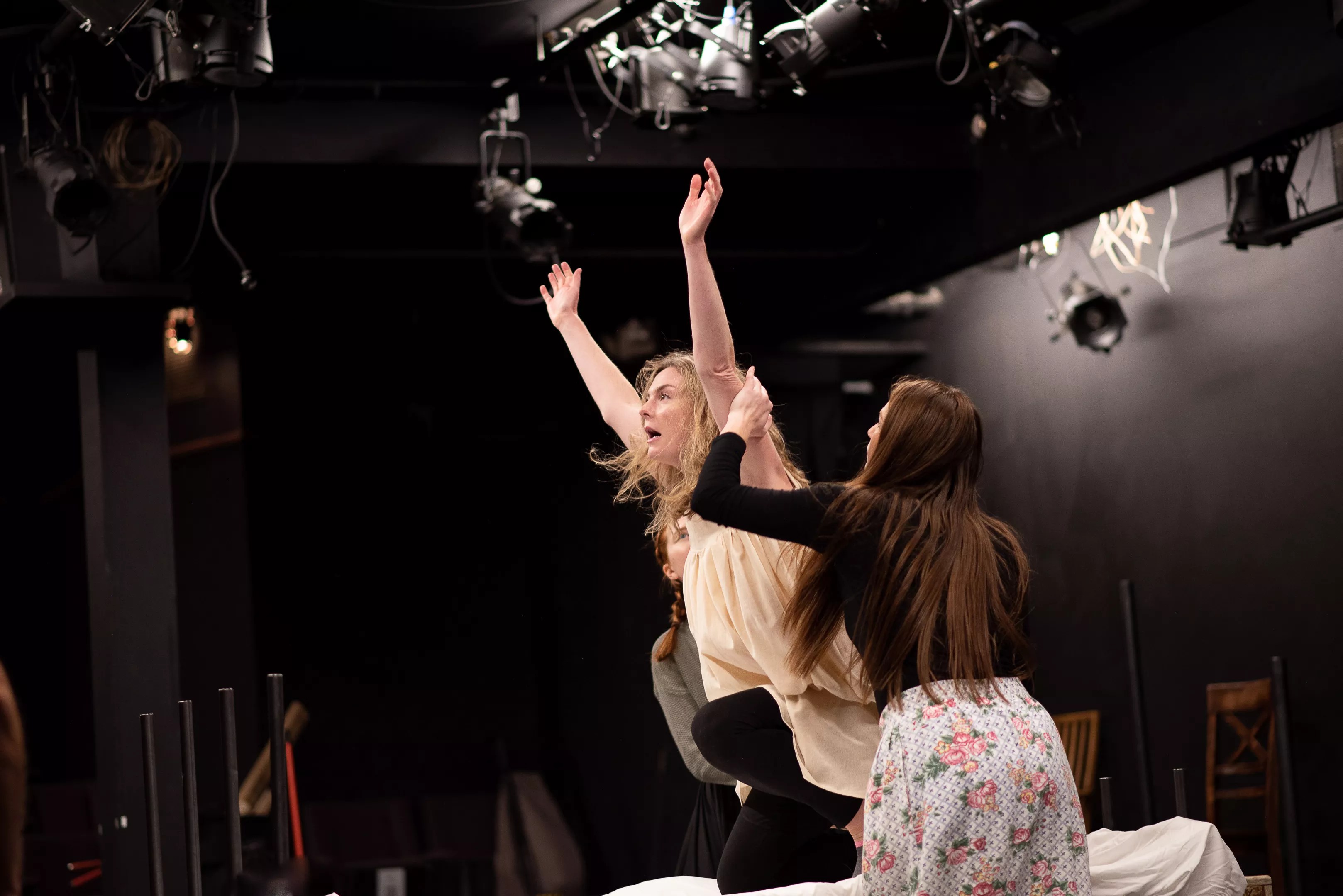
Colleen Lee

Audio By Carbonatix

Anastasia Davidson as Elizabeth Proctor in the Miners Alley production of The Crucible.
Colleen Lee
Artistic director Len Matheo guided Miners Alley Playhouse through the past eighteen months with grit, creativity and determination. Moving from online productions, he began the current season with two fascinating and locally written plays – Max Posner’s The Treasurer and John Ashton’s Before You Go – and attendance grew slowly but steadily as devoted audience members began returning. Now Matheo is finally doing the work he loves most, directing a production of an American classic: Arthur Miller’s The Crucible. Written in 1953, the play was inspired by the witch hunts in seventeenth-century Salem and reflects all the delusion, hysteria and mass violence of that time.
“Ever since the pandemic, I’ve spent all my waking hours helping the theater survive,” Matheo says. “Raising money, trying to keep people employed, and not creating any art. I just was not in my element. It was not the reason I do theater. But once I started directing this, I can’t tell you how excited I am, being in a flow state and being around inspiring people.”
The Crucible was originally planned for the 2020 season, and during auditions in 2019, Matheo found himself facing difficult casting choices. “We had the best talent in Colorado coming to audition,” he recalls. “There were three choices for the character of Abigail, three for Elizabeth, all of them fantastic. I have an amazing cast of professionals. Literally from the first day, they just brought their A-game. It’s been a really lovely synergistic process, with the sum greater than the parts.”
The thirteen-member cast includes Jihad Milhem, Anastasia Davidson, Rebakah Goldberg, Sam Gilstrap and Jim Walker.
The production is set not in Salem, but in a timeless world, and the tech is intended to make the characters’ delusions feel real for the audience. Matheo is working with musician-composer Gary Grundei on sound design and to create original music, too. “I need this to be scary,” he says. “I gave him the concept on the phone, and the sounds I was going for.” The result is “lovely,” he adds. “And we also found we have all these cover songs of big hits from the 1980s; we’re using and playing with the sounds of those. He listened to my vision and is making that a reality. He’s just brilliant.”
The setting is not the only twist that Matheo is giving this production; he has his own ideas about the characters. He doesn’t see John Proctor positively as “a man who has found himself, forgiven himself and come to peace with the mistakes he’s made,” as many do, he says. “Yeah, he’s a fighter, but there’s the lack of action and trying to hide what he’s done. He also had an affair with a much younger woman.” And while Abigail Williams is the cause of several deaths and is almost universally considered the villain of the piece, “she’s just as much a victim who’s been gaslighted by John Proctor throughout the play,” Matheo notes.
Playwright Arthur Miller knew something about communal madness. In 1956, he was called before the House Committee on Un-American Activities, where he answered questions about his own life but refused to provide the names of others. The warnings of both Salem’s historical witch hunts and the McCarthy era feel highly relevant today.
“Look at January 6,” Matheo says. “The groupthink, and the criminals outside the Capitol with a gallows set up supposedly to hang Mike Pence. Talk about spooky. That’s one of the reasons this production is set in Anytime, Anyplace, USA. We have contemporary elements built into the costumes, too. The character arresting Elizabeth Proctor has zip ties. At one point, Proctor has a leather bag over his head; he’s the prisoner who’s been tortured. These are images that are seared into our minds. The other side of it is the oppression of women. All the women have headscarves on. Sexual repression is another big element for me.
“Yes, it’s relevant to today,” he continues. “I wish it wasn’t. When the play’s set in Salem 1692, you can think, ‘Well, we’re different now.’ I don’t want people to have the comfort of seeing this is in the irreparable past.”
And just like the far right, the far left presents a problem, too, he suggests: “The antifa can take it to the next level and start shooting people. It could be anybody. If people feel threatened enough, they are going to go out and create violence. How much further can people be pushed? Everyone, I think, is capable of getting into this groupthink. We commit to shaming the other, think we find a criminal in our midst, cancel somebody, go after them. Then, if it’s wrong, everyone still tries to defend their opinion. I worry about people on the left, myself included – that we could become just as bad as them.”
So at Miners Alley, The Crucible will be much more than a rehashed production of a classic. Running at three hours, it’s a long play. “But I can tell you, it’s not boring,” promises Matheo. “It’s riveting.”
The Crucible opens Friday, October 8, and runs through November 7 at Miners Alley Playhouse,1224 Washington Avenue in Golden. Get more information and tickets at 303-935-3044 or minersalley.com.